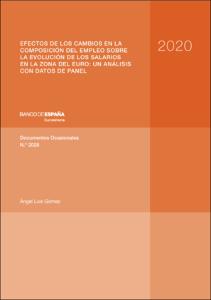Efectos de los cambios en la composición del empleo sobre la evolución de los salarios en la zona del euro: un análisis con datos de panel
Autor
Fecha de publicación
25-nov-2020
Descripción física
26 p.
Resumen
En la zona del euro, la composición del empleo experimentó variaciones significativas desde el comienzo de la crisis financiera, particularmente en lo referente a la edad y al nivel educativo de los asalariados, así como en la incidencia de la contratación temporal. En este trabajo se explotan dos nuevos conjuntos de datos de panel para estimar en qué medida los cambios en la composición del empleo desempeñaron un papel importante a la hora de explicar el débil crecimiento de los salarios en el conjunto de la zona del euro y en sus principales países miembros durante la etapa de recuperación económica que siguió a la crisis financiera. Este tipo de análisis, en el que se sigue al mismo individuo durante varios períodos de tiempo, permite tratar econométricamente el efecto de la productividad individual, así como evitar determinados sesgos que podrían afectar al uso de datos de sección cruzada. Se concluye que los cambios en la composición del empleo ejercieron cierto efecto positivo sobre los salarios en la zona del euro entre 2010 y 2012. Sin embargo, a partir de 2013 y hasta 2017, último período para el que se dispone de datos individuales, este efecto cambió de signo y aumentó de magnitud, amortiguando el crecimiento de los salarios agregados. En los dos últimos años analizados, el efecto fue particularmente relevante, situándose su impacto en el entorno de 1 punto porcentual. La corrección del efecto de los cambios de composición en el empleo sobre los salarios permite obtener una relación más estrecha entre estos y las condiciones cíclicas.
In the euro area, the composition of employment has changed significantly since the onset of the financial crisis, particularly in terms of employees’ age and educational level, in addition to the incidence of temporary contracts. This paper exploits two new panel datasets to estimate the extent to which changes in the composition of employment were behind weak wage growth in the euro area and in its main member countries during the economic recovery following the financial crisis. This type of analysis, which follows the same individual over several periods of time, allows the effect of individual productivity to be treated econometrically and certain biases that could affect the use of cross-sectional data to be avoided. It is concluded that changes in the composition of employment had some positive effect on wages in the euro area between 2010 and 2012. However, from 2013 until 2017, the last period for which microdata are available, this effect turned negative and increased in magnitude, dampening aggregate wage growth. In the last two years the effect was particularly significant, with an impact of around 1 percentage point. Correcting for the effect of changes in the composition of employment on wages leads to a closer relationship between wages and cyclical conditions.
In the euro area, the composition of employment has changed significantly since the onset of the financial crisis, particularly in terms of employees’ age and educational level, in addition to the incidence of temporary contracts. This paper exploits two new panel datasets to estimate the extent to which changes in the composition of employment were behind weak wage growth in the euro area and in its main member countries during the economic recovery following the financial crisis. This type of analysis, which follows the same individual over several periods of time, allows the effect of individual productivity to be treated econometrically and certain biases that could affect the use of cross-sectional data to be avoided. It is concluded that changes in the composition of employment had some positive effect on wages in the euro area between 2010 and 2012. However, from 2013 until 2017, the last period for which microdata are available, this effect turned negative and increased in magnitude, dampening aggregate wage growth. In the last two years the effect was particularly significant, with an impact of around 1 percentage point. Correcting for the effect of changes in the composition of employment on wages leads to a closer relationship between wages and cyclical conditions.
Publicado en
Documentos Ocasionales / Banco de España, 2028
Materias
Efectos de composición; Datos de panel; Efectos fijos individuales; Compositional effects; Panel data; Individual fixed effects; Modelos econométricos; Renta, empleo y precios; Mercado de trabajo; Zona euro
Aparece en las colecciones:












